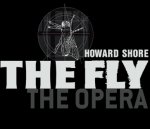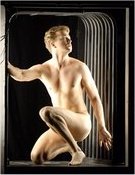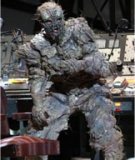
 |
|
REVIEWS : Operas
earlier film reviews: Fly Me to the Moon (Gary Westfahl) The Dark Knight (Gary Westfahl) Journey to the Center of the Earth (Gary Westfahl) Wall-E (Gary Westfahl) Dreams with Sharp Teeth (Gary Westfahl) Indiana Jones and the Kingdom of the Crystal Skull (Waldrop & Person) - 2008 Reviews Archive - Index to Movies Reviewed on Locus Online Index by Reviewers |
28 September 2008
 Conducted by Plácido Domingo and Israel Gursky
Conducted by Plácido Domingo and Israel Gursky
Libretto by David Henry Hwang, based on the 1957 short story by George Langelaan and the 1986 motion picture with screenplay by David Cronenberg and Charles Edward Pogue Directed by David Cronenberg Starring Daniel Okulitch (as Seth Brundle), Ruxandra Donose (as Veronica Quaife), Gary Lehman (as Stathis Borans) Official site: The Fly The Opera The Fly, an opera by composer Howard Shore with a libretto by David Henry Hwang -- based on the original 1957 Playboy short story by George Langelaan, which has been reprinted at least 15 times, and on the second film version thereof, directed by David Cronenberg (with a screenplay by Cronenberg and Charles Edward Pogue, and starring Jeff Goldblum and Geena Davis) – debuted in Paris in July 2008, though it was commissioned by the Los Angeles Opera, where it played in Los Angeles six times from September 7th through the 27th. I attended the September 20th performance. The Fly, as an opera?? Well, why not? A moment's thought about the standard opera repertory brings to mind any number of bizarre and fantastical themes and plots (not the least of which is of course Wagner's Tolkienesque Ring cycle); and the L.A. Opera commissioned another fantasy-based opera by another noted film composer just a couple years ago -- Elliot Goldenthal's Grendel. This new opera follows the 1986 film quite closely. For readers not familiar with the films or original story, "The Fly" concerns a brilliant, eccentric scientist, Seth Brundle, who has developed a teleportion device. When he tests it on himself, unbeknowst to him, an ordinary housefly is caught inside the source 'telepod' with him; when he transports himself (and the fly) to the target telepod, he is melded with the fly, and over the course of several weeks and months, his human form gradually transforms into a bizarre and increasingly disgusting hybrid. (The 1986 film made liberal use of then state-of-the-art gory make-up effects -- on the order of Alien's -- for which it won an Oscar Award.) The opera notes make the point that the opera is not an 'adaptation' of the film, but it does follow Cronenberg's 1986 film very closely (which is nothing like the earlier 1958 film with Vincent Price). In fact, while Placido Domingo is the principal conductor of this production, David Cronenberg himself is credited as the director (and Denise Cronenberg is the costume designer). The opera has the same focus on three principle characters: Seth Brundle, the eccentric scientist; Veronica, the journalist he meets at a party; and Veronica's boss and ex-lover, Stathis -- an ideal operatic love triangle. The opera follows the structure of that film precisely -- the drama splits neatly at the half-way point, the opera's intermission, the point at which Brundle submits himself to his invention -- and includes every key scene: the initial party encounter between Seth and Veronica; the test on the baboon that turns it inside out (done on stage with puppets inside the telepods); the romance between Brundle and Veronica that inspires Brundle to overcome his problems with transporting living creatures; the scene in the bar in which Brundle breaks the arm of an armwrestler; and the successive transformations into grotesque creatures as he is merged with the fly. (One bit the opera does not try to depict is the fly's method of eating, by vomiting digestive fluids onto its food -- though it is mentioned in the dialogue.) There is even a scene, at the opening of Act Two, in which a double of the singer playing Brundle performs a couple acrobatic maneuvers on stage (to which the audience applauds -- not realizing, immediately, that it is a double), to illustrate Brundle's new athleticism; and later, the singer himself crawls across stage suspended on the underside of a catwalk, as if clinging to the ceiling. (In the film, it was done with Jeff Goldblum crawling around a rotating set.)
So then, as an opera? What about the music? Well, Howard Shore is known as a film composer (The Fly is his first opera), his greatest success being his scores for the three Lord of the Rings films, for which he won Oscars for the first and third, though my impression as a film music fan is that these were among his most conventional works; like Elliot Goldenthal, mentioned above, Shore has been mostly associated with smaller, independent films, for which he's composed relatively contemporary music. The Fly's music is very colorful, and often quite lovely from moment to moment, and not at all like Shore's Lord of the Rings scores, let alone typical overbearing John Williams/Hans Zimmer-style Hollywood film music. It does resemble some more adventurus film music by Shore himself, or Goldenthal, or the avante garde 1960's turns by Jerry Goldsmith -- spicy with dissonance, avoiding predictable turns, flirting with atonality -- even as the orchestral color and phrasing provide recognizable support for the nature of the drama unfolding on stage. Still, what the music does lack -- not that it's *supposed* to be any kind of 'traditional' opera -- is any kind of hook; it doesn't build to anything beyond each individual scene, and there are no obvious arias, though there are two what might be called arias at the end of act one, one for Brundle and one for Veronica. The music is inticing and pleasant enough all the way through, but there's no sense of it adding up to anything. I say this, concurring with general critical reaction to the opera, and with audience intermission buzz, fully aware that I don't believe worthwhile critical judgment can be formed about new music upon first hearing. (I've blogged about this...) The more attractive and catchy a new musical work might seem, the more superficial and grating it will likely be after a few hearings. The history of music is full of canonical works -- from Beethoven to "The Rite of Spring" to Philip Glass -- that garnered indifference or hostility upon their premieres, only to eventually become part of the standard, beloved, repertory.
The opera, as a stage work, does transcend, at least modestly, the 1986 film in a couple ways. First is the philosophical notion of the 'new flesh' -- Brundle realizes his discovery isn't just something that will change the world because it will serve as a revolutionary transportation system, but that it creates something entirely new, a new form of fleshly existence. This ties neatly with the story development -- Brundle's breakthrough, that enables him to transport living things through the telepods, comes after he accepts the 'flesh' in the sense that he's fallen in love with Veronica and is sleeping with her -- a turnabout from his earlier shy geekhood. Finally, the opera goes just a bit past the final scene of that film -- in which ** SPOILER ALERT!!! ** -- Veronica takes a rifle to the completely transformed (and contorted) Brundlefly, putting him out of his misery. In the opera, which is framed by brief scenes in which Veronica is relating this entire story to a female police detective, she concludes by telling the detective that she plans to keep Brundle's baby (which earlier she had tried to have aborted). She will keep Brundle, and the new flesh that has come into the world, alive. She raises her arms in glorious determination, then slowly lets them fall, and the music and lights fade out. | |
|
|
| © 2008 by Locus Publications. All rights reserved. |
 Stagecraft isn't completely like the film's; the stage production's two 'telepods' have, apparently, trapdoors beneath them to enable the actor/singer to move from one to the other during a scene -- the key scene being at the end of Act One, as Daniel Okulitch, performing Seth Brundle, appears completely nude as he doffs his clothes and steps into the source pod, and then emerges a minute or so later from the target pod, standing triumphantly and nakedly forward (though highly backlit) as the curtain falls. (In the film, Goldblum's nudity was discretely hidden with camera angles and foregrounds.) And, more to the score's point, the computer feedback in the film is carried in the opera by an unseen chorus, chanting details about DNA and teleportation failure.
Stagecraft isn't completely like the film's; the stage production's two 'telepods' have, apparently, trapdoors beneath them to enable the actor/singer to move from one to the other during a scene -- the key scene being at the end of Act One, as Daniel Okulitch, performing Seth Brundle, appears completely nude as he doffs his clothes and steps into the source pod, and then emerges a minute or so later from the target pod, standing triumphantly and nakedly forward (though highly backlit) as the curtain falls. (In the film, Goldblum's nudity was discretely hidden with camera angles and foregrounds.) And, more to the score's point, the computer feedback in the film is carried in the opera by an unseen chorus, chanting details about DNA and teleportation failure.
 I would listen to this opera again; if it comes out on CD, I'll buy it.
I would listen to this opera again; if it comes out on CD, I'll buy it.